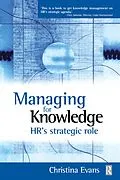Whilst there are many books on knowledge management there are few aimed directly at HR practitioners and the critical role that they can play in building a knowledge-centric culture. This practical book draws on the author's own experience, as well as that of leading-edge Human Resource and Knowledge Management practitioners (including Linda Holbeche, Elizabeth Lank, and David Snowden), each of whom recognise that building a knowledge-centric culture cannot be achieved through technology alone. It covers areas such as: * Defining the key ingredients of a knowledge-centric culture * The changing structures, roles and responsibilities needed to create a knowledge-centric culture * HR's unique contribution to building a knowledge-centric culture, together with practical steps for getting started on the KM journey and for keeping the momentum going * Tools and techniques for: opening up a dialogue about why knowledge management is crucial for business and personal success; knowledge mapping; encouraging and facilitating knowledge sharing, as well as ways of identifying key knowledge players * How to help your organisation reframe its assumptions about learning in the knowledge economy * How to ensure that your HR practices are knowledge aligned
Autorentext
Christina Evans
Inhalt
Part 1 The Strategic Context for HR's Role in Managing for Knowledge; Chapter 1 The changing world of business and the imperative for managing knowledge; Chapter 2 The changing role of HR - from operational to strategic HR; Chapter 3 Towards a blueprint for building a knowledge-centric culture; Part 2 Building a Knowledge-centric Culture; Chapter 4 Structures, roles and responsibilities in a knowledge-centric culture; Chapter 5 HR's role in building a knowledge-centric culture; Chapter 6 Re-visiting learning in the knowledge economy; Chapter 7 Understanding the motivation for learning amongst knowledge workers; Chapter 8 1. I am indebted to Elizabeth Lank, independent consultant, and previously head of ICL's Mobilising Knowledge Programme, for helping me develop this chapter by sharing her experience of building and supporting Communities of Practice within organisations.; Part 3 Building HR's KM Credibility and Capabilities; Chapter 9 Aligning HR and KM practices; Chapter 10 Knowing what we know: language and tools for knowledge mapping; Chapter 11 Building your KM toolkit; Chapter 12 Using technology wisely; Chapter 13 Summary and conclusions;
